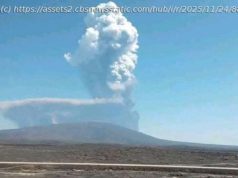The tiny moon is ejecting organic molecules into space. Saturn’s moon Enceladus has been ejecting molecules into space that may indicate that there is life…
The tiny moon is ejecting organic molecules into space.
Saturn’s moon Enceladus has been ejecting molecules into space that may indicate that there is life somewhere deep within its oceans. What’s more, this stunning revelation comes from the data revealed by a long-dead spacecraft.
As National Geographic reports, before the Saturn-exploring Cassini spacecraft committed suicide in 2017 by plunging itself into Saturn’s atmosphere, it had sent back mountains of data — data that is still being crunched to this day. And the latest revelation from that data may be the most promising yet.
Back in 2005, the spacecraft sent back images of icy jets erupting from beneath the frozen surface of the moon’s vast saltwater oceans. Cassini sent back images, chemical markers, and countless other bits of data back to scientists, enabling the team to determine the salinity and the acidity of the ocean; to detect organic compounds such as methane in the oceans; and to even determine that hydrothermal vents in the ocean floor were providing heat and energy.
That alone got scientists excited at the possibility that there may be life down there. But now there’s even more exciting news: heavy organic compounds containing hundreds of atoms arranged in rings and chains. That’s not proof of life, but it’s pretty darn close, says Cornell University’s Jonathan Lunine.
“What we know today is telling us that Enceladus is an outstanding target to go look for life, and there may be microbes living in that ocean today.”
Complex organics bubble from the depths of #Saturn ’s ocean-moon Enceladus, the first ever detection of such organics coming from an extraterrestrial water-world, data from @CassiniSaturn finds. Full story: https://t.co/44q7lbmU3n pic.twitter.com/eG3BnJO81f
— ESA Science (@esascience) June 27,2018
“We cannot decide this hundred-million-dollar question, but it certainly shows that something is going on there, that complex organic chemistry is happening and that we can probe it from space.”
Short of sending another craft up there to take a closer look at Enceladus, there’s no knowing for sure. But as it turns out, the European Space Agency has two such missions in the works: Europa Clipper and JUICE, which are scheduled to launch in 2022. The bad news: those missions aren’t scheduled to study Enceladus, but rather Jupiter’s moons Europa and Ganymede. The good news: both of those moons are believed to potentially harbor life as well.






